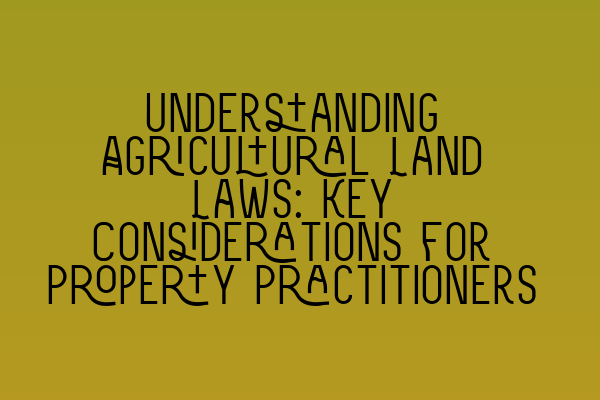Understanding Agricultural Land Laws: Key Considerations for Property Practitioners
As property practitioners, it is crucial to have a comprehensive understanding of the legal landscape surrounding agricultural land. Agricultural land laws govern the buying, selling, and leasing of land for agricultural purposes. Failing to navigate these laws correctly can lead to costly legal complications and disputes. In this article, we will provide key considerations for property practitioners when dealing with agricultural land.
1. Familiarize yourself with the relevant legislation
The starting point for any property practitioner dealing with agricultural land is to familiarize themselves with the relevant legislation. In the UK, the primary legislation governing agricultural land is the Agricultural Holdings Act 1986 and the Agriculture Act 1993. These acts set out the rights and obligations of both landlords and tenants, including provisions on rent, succession, and termination of tenancies.
2. Understand the different types of agricultural tenancies
Agricultural tenancies come in various forms, and it is crucial to understand the differences between them. The three main types of tenancies are:
– Full Agricultural Tenancies: These tenancies are governed by the Agricultural Holdings Act 1986 and provide the tenant with long-term security of tenure.
– Farm Business Tenancies: Introduced by the Agricultural Tenancies Act 1995, these tenancies are more flexible and can be for a fixed term.
– Grazing Licenses: These licenses allow the licensee to use the land for grazing purposes, typically on a seasonal or short-term basis.
Property practitioners must be aware of the specific provisions and regulations relating to each type of tenancy to ensure compliance and protect their clients’ interests.
3. Consider environmental regulations and subsidies
Agricultural land is subject to various environmental regulations and subsidies. The Common Agricultural Policy (CAP) is an EU scheme that provides financial support to farmers and landowners. However, with the UK’s departure from the EU, the CAP has been replaced by new agricultural subsidy schemes.
Property practitioners should be cognizant of these changes and advise their clients on the potential impact on their agricultural land investments. It is important also to consider any environmental regulations that may impact land use and development.
4. Be mindful of agricultural restrictions and covenants
When dealing with agricultural land, it is essential to carefully review any restrictions and covenants. These may include limitations on the use of the land, such as prohibiting certain agricultural practices or requiring compliance with specific regulations. Understanding these restrictions is crucial for both buyers and sellers to mitigate any potential legal issues.
5. Consult experts in the field
Agricultural land laws can be complex and subject to frequent changes. To ensure the best outcome for your clients, it is highly recommended to work closely with experts in agricultural law. They can provide valuable insights and guidance on specific issues, making the entire process smoother and more efficient.
Conclusion
Understanding agricultural land laws is essential for property practitioners dealing with agricultural land transactions. Familiarizing yourself with the relevant legislation, understanding the different types of agricultural tenancies, considering environmental regulations and subsidies, being mindful of restrictions and covenants, and consulting experts in the field are all crucial steps to protect your clients’ interests and avoid legal complications.
For further information on related topics, please refer to the following articles:
– Understanding Contractual Capacity: Rights and Limitations
– Interactive SQE Mock Tests for Contract Law: Test Your Knowledge
– Join Our SQE Contract Law Webinars: Expert Insights and Guidance
– SQE Prep: Mastering the Essentials of Contract Law
– Contractual Capacity: Understanding Legal Competence in Contracting Parties
By following these guidelines and staying up-to-date with the latest developments in agricultural land laws, property practitioners can confidently navigate the complexities of agricultural transactions and provide their clients with exceptional service.
